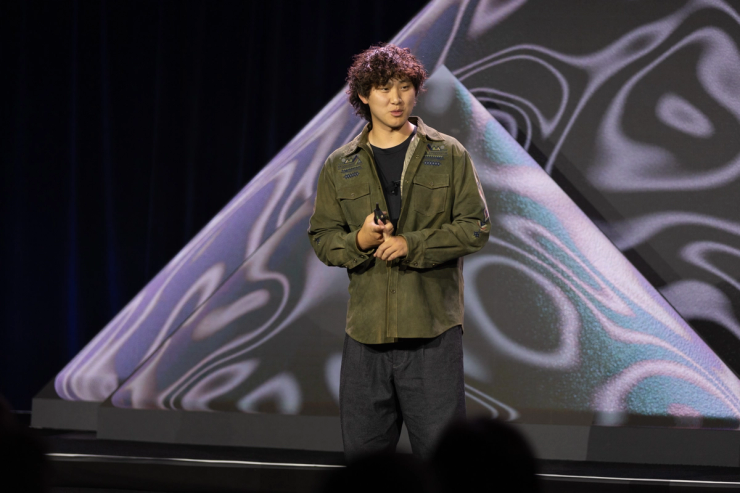The Scoop
Scale AI CEO Alexandr Wang is taking out a full-page ad in The Washington Post on Tuesday with a succinct message for the new US commander-in-chief: “Dear President Trump, America must win the AI war.”
The ad also pointed readers to a five-point plan that would reorient the federal government to invest more in the technology and overhaul priorities for that funding.
In an exclusive interview with Semafor, Wang said he was motivated to make his recommendations by a new White House that is both planning to aggressively support new technology and courting input from the industry. “They’re listening,” he said. “This incoming administration wants to move fast and take a lot of action and really be quite ambitious about a lot of these issues.”
Scale, now worth $14 billion, has helped make Wang an influential figure in the industry, with the ear of government officials and tech titans alike. On Monday morning, he was on his way to the Capitol as a guest at Trump’s inauguration, along with Amazon founder Jeff Bezos, Alphabet CEO Sundar Pichai, and Meta boss Mark Zuckerberg.
Wang, who turned 28 this week and is the world’s youngest self-made billionaire, said the federal government needs to spend more on the development of AI to compete with the Chinese government’s massive investment in the area. Money aside, the US should also change how it invests, he said.
Currently, the government puts 90% of its AI investment into algorithms, such as academic and theoretical research, he said, with the remaining 10% going toward compute power and data. The allocation of funding to those three pillars of AI, he says, should look more like the private sector’s investments: 60% on compute, 30% on data, and 10% on algorithms.
In this article:
Now What?
In the AI race, raw compute power is becoming increasingly important as models evolve. New techniques that run models multiple times for better results have led to impressive new “reasoning” capabilities but consume far more processing power.
“What’s undeniable, if you think about what the future is going to look like, is the degree to which the amount of computational capability you have will be directly related to how strong your AI capabilities are,” Wang said before he arrived at the World Economic Forum in Davos.
Wang also recommends the US government should make a larger effort to cut the red tape on new energy production, inviting pent-up demand for private sector investment in the area.
He also argues that the US government needs to embrace the use of AI itself, modernizing how it stores and collects data to be used for national security and other purposes.
“It gets said a lot that China is just way ahead on data and it’s going to be impossible for us to catch up. I think it’s a choice,” he said. “The US government in many areas, national security being one, actually has far more data than the Chinese Communist Party, and it actually can be a source of great advantage for us.”
Know More
Wang co-founded his company in 2016 to help customers train AI models. Scale has amassed a vast network of hundreds of thousands of contractors globally who can label and generate data used in a wide array of AI training tasks.
Wang’s upbringing in Los Alamos, New Mexico, where his parents were physicists at the National Laboratory, helped instill in him a strong sense of patriotism.
He has long warned of China’s ascendency in AI, which could lead to a military advantage over the US and increase the likelihood of war between the two countries.
Wang’s view has become popular among Silicon Valley’s elite. As the Trump administration taps tech industry veterans to lead on AI policy, some of his recommendations could lead to more action than in the past.
“Over the weekend, I’ve been able to have conversations with a lot of people going into the administration, including some of the cabinet secretaries, and there’s basically completely uniform excitement about AI technology,” he said.
Wang has also suggested a measured approach to AI safety that prioritizes winning the technological race.
“We need to make sure that we are thoughtful about it and that we set the right standards to ensure that we don’t have any sort of major risks or major harms produced by the technology,” he said. “Safety is not the number one goal. Leadership is the number one goal.”
Wang also defused fears that AI will cause massive job losses and labor disruptions. “It’s within our control to make sure that’s not the future,” he said, arguing that AI will ultimately create more jobs and economic growth, so long as the US finds ways to support workers shifting to new roles created by AI.
Reed’s view
Wang is far from the only heavy hitter in Silicon Valley to call for more government support for the development of AI in the US. But his specific recommendations are worth note because of his prominence in the industry.
Wang is part of a generation of technologists who saw the AI wave early, and he’s remained right in the middle of it ever since. During the pandemic, he was roommates with OpenAI CEO Sam Altman, a close friend, when the foundations of ChatGPT were being built.
Some critics view these ideas as self-interested hype, but I think that simplistic lens is a huge mistake. The consequences of dismissing the importance of AI could be dire for the US.


